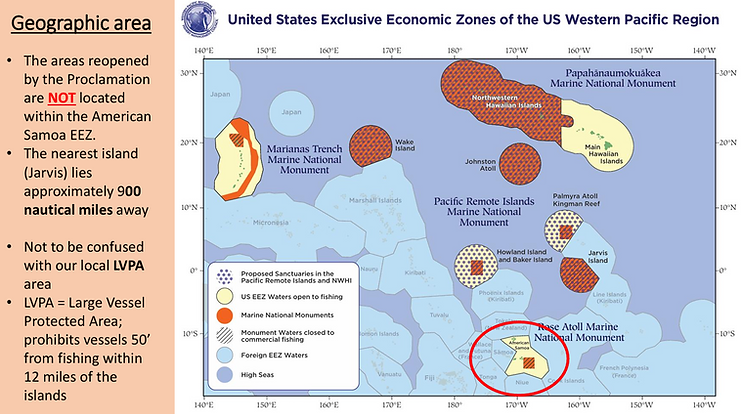
American Samoa Government - PR001-05152025
Posted: May 15, 2025
Reopening U.S. Fishing Grounds: What It Means for American Samoa
Setting the Record Straight on Environmental Protections and Economic Reality

PAGO PAGO, AMERICAN SAMOA – In light of ongoing public discussion regarding the reopening of certain U.S. Pacific fishing grounds, the American Samoa Government (ASG) is issuing this release to clarify key facts, address misconceptions, and explain the local significance of this federal action.
This information is based on a comprehensive presentation prepared by Archie Soliai, Executive Advisor for Natural Resources, following his recent visit to Washington, D.C., where he met with President Donald J. Trump and joined Congresswoman Aumua Amata to advocate for the interests of American Samoa’s vital fisheries industry.
Background
-
The Pacific Remote Islands Marine National Monument (PRIMNM) was established in 2009 under President George W. Bush.
-
In 2014, President Barack Obama expanded the monument, prohibiting commercial fishing across nearly 500,000 square miles of U.S. waters.
-
In 2025, President Donald J. Trump issued a proclamation reopening these waters to U.S.-flagged commercial fishing vessels.
Although these areas are outside of American Samoa’s Exclusive Economic Zone (EEZ), the decision carries major economic implications for the territory’s tuna industry and long-term economic sustainability.
Why This Matters to American Samoa
-
The tuna industry supports over 83% of private-sector jobs in American Samoa.
-
It accounts for 99% of local exports.
-
StarKist Samoa processes more than 100,000 tons of tuna annually, producing over 500 million cans
-
of shelf-stable tuna—primarily for the U.S. market.
-
1 in 4 cans of shelf-stable tuna sold in the U.S. originates from American Samoa.
-
“This is not just a policy issue—it’s a matter of economic survival for our people,” said Archie Soliai. “We
-
are advocating for fairness, sustainability, and opportunity.”
-
Reopening U.S. Fishing Grounds: What It Means for American Samoa
-
Setting the Record Straight on Environmental Protections and Economic Reality
Environmental Protections Remain in Place
ASG emphasizes that the reopening of these fishing grounds does not eliminate existing environmental protections. Key facts include:
-
Fishing remains prohibited within 0 to 50 miles of the protected monument islands.
-
Coral reefs, marine mammals, seabirds, and turtles remain protected under federal laws including
-
the Endangered Species Act (ESA), Marine Mammal Protection Act (MMPA), and Seabird Conservation Measures (SMA).
-
U.S.-flagged fishing vessels must adhere to rigorous conservation standards under the Western and Central Pacific Fisheries Commission (WCPFC).
-
Scientific assessments confirm that tuna stocks in these waters are healthy and not overfished.
“There has been a lot of misinformation, but the reality is that environmental safeguards remain firmly in place,” Soliai stated. “This is a measured decision, not a reckless one.”
Economic Justice and Fair Competition
American Samoa continues to face high production costs compared to global competitors like Thailand, Vietnam, and Indonesia. Yet, the territory plays a strategic role in the U.S. tuna supply chain thanks to:
-
Duty-free access to the U.S. market
-
Proximity to rich fishing grounds
-
Compliance with high labor and environmental standards
-
These advantages ensure American Samoa’s tuna products meet federal procurement standards,
-
including for the U.S. Department of Defense (DoD) and USDA’s National School Lunch Program.
A Path Forward
-
Reopening these fishing grounds is expected to:
-
Support American Samoa’s workforce and economy
-
Strengthen U.S. food security
-
Ensure continued environmental stewardship
-
Maintain competitiveness of U.S. fishing fleets
The American Samoa Government encourages all residents and stakeholders to stay informed and to rely on verified sources when discussing this important issue.
For additional information or clarification, please contact the Office of the Governor at [684-633-4121].
###




